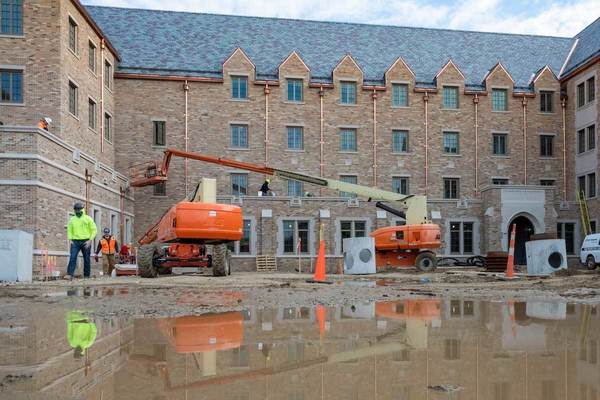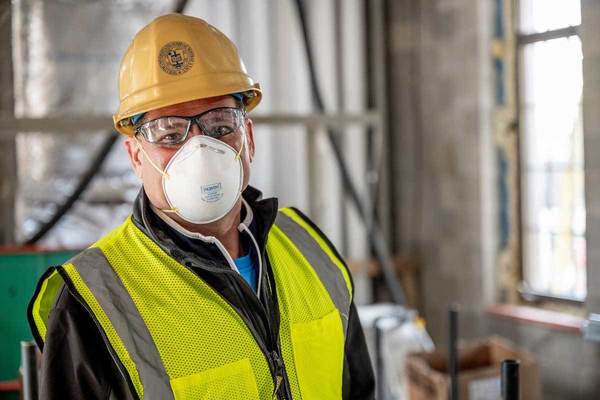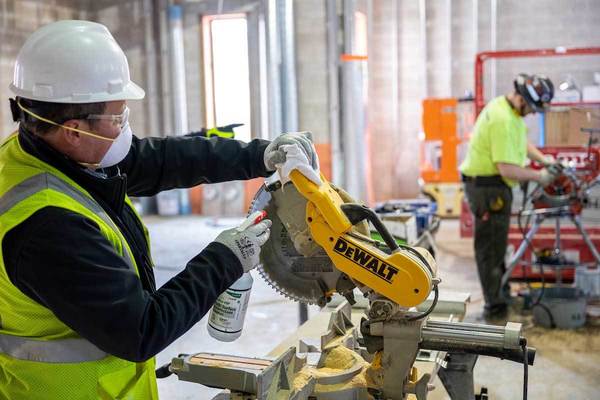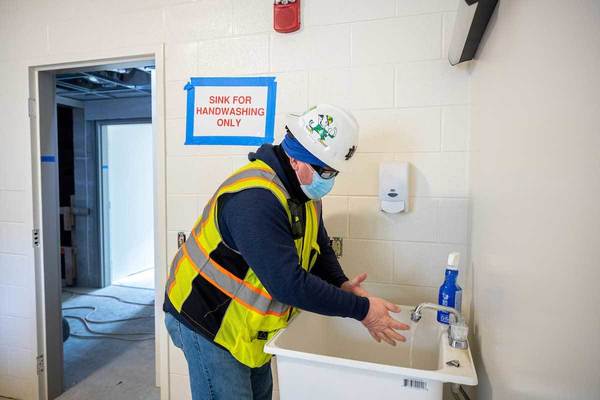
There are some jobs that cannot be done remotely. For example, every day, five construction administrators, led by Tony Polotto, director of quality assurance, visit dozens of campus construction sites — major capital projects such as Johnson Family Hall, Corby Hall and McKenna Hall, as well as numerous renovation projects on campus including labs and offices in McCourtney Hall, Harper Hall and Cushing Hall, among others. The team must ensure that design plans are meticulously followed and that work is being done safely and with a high degree of quality.
What is different are the added safety precautions in place to protect everyone at construction sites from the coronavirus.
The pandemic has had a significant impact on the construction trades. Now, there are sanitizing stations strategically placed at each construction site on campus and all sites are regularly disinfected. At Notre Dame, most tradespeople know each other: They have worked alongside each other for years on the same jobs, so they are interested in keeping each other safe. If someone were to become sick, it could quickly affect a job site, so they look out for each other.

“Our contractors implemented major changes on the job sites right away in an attempt to keep everyone safe,” says Polotto. “On any given day, we can range anywhere from 200 to 400 workers on campus, so it’s of utmost importance that everyone feels safe when they come to work and that they go home safely.”
Despite the pandemic and the changes in work routines, all major projects are on schedule to be completed on time.
In addition to the standard personal protective equipment of hard hats, gloves, long sleeves and eye protection, crews now maintain a 6-foot distance and many wear face masks. Every company has dedicated staff to wipe frequently touched surfaces. Many of the construction companies bought special equipment, so individuals can work independently. In the past, a 250-pound door would have been installed by two people, but with new equipment that stabilizes a door, an individual can hang a door by him or herself. Crew members are not allowed to share tools unless they have been disinfected, and everyone disinfects their own tools twice per day.

“We’ve also allowed contractors to work across multiple shifts,” Polotto says. Instead of having a crew of 70-80, there now may be two shifts of 30 to 40 people. “We’re trying to think out of the box.”
At Dillon Hall where a year-long renovation is nearing completion, three times a day a contractor wipes down all high-touch surfaces: door handles, faucets and countertops. When there was a shortage of masks available, the wife of the Dillon Hall construction superintendent, Mark Grove, volunteered to make some. She quickly sewed enough for everyone who wanted one at the job site.
To date, none of the construction workers has been diagnosed with the virus.
Polotto and his team are being proactive to assess material availability. While Notre Dame prides itself on buying local, some supplies like marble sinks and countertops that come from Berrien Springs are not being shipped as construction is considered a non-essential industry there. Likewise, hose for fan coil units is being held up at the Candian border, but thankfully, no critical components are delaying any job. The counters and hose will simply be installed when they arrive.

Many of the current projects are central to the University’s mission and must open this summer or fall for housing, research or administration. Next week, a news article will update campus on all of the University's major construction projects.